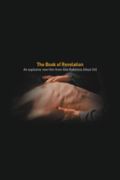
Directed by
Ana Kokkinos
117 minutes
Rated R
Reviewed by
Andrea Buck

The Book Of Revelation
Synopsis: Daniel (Tom Long), a beautiful male dancer in the prime of his career suddenly goes missing on the opening night of a performance for choreographer Isabel’s (Greta Scacchi) dance company as a principal alongside his girlfriend Bridget (Anna Torv). Devastated, but unable to locate him, Isabel insists the show goes on. Just as mysteriously, Daniel re-emerges twelve days later a broken man, unable to resume his life and art and unable to speak of his ordeal. We get to witness his traumatic lost days as he relives his bizarre imprisonment, during which he was abducted by three masked and cloaked women, locked up, assaulted, humiliated and sexually abused before being dumped back into the world. Too humiliated to seek help, Daniel embarks on a quest to find the identity of the women and becomes caught up in ravaging sexual journey that almost destroys what is left of him.The Book Of Revelation is an erotic thriller/ horror story; a mystery; an exploration into the dark side of the feminine and an insight into the power play between men and women as it reverses the more common situation of woman as the victim and man as the perpetrator of violent sexual crime.
I’m not sure if in the real world there has ever been a comparable incident to that depicted here – of women enacting a vicious sexual crime against a man - although I am willing to allow the act to be a metaphor for feminine violence against the masculine in more general ways. This film clearly gets the mind working, trying to articulate the messages behind the story, to uncover the greater meaning in its mysterious dramatic unfolding, especially in the themes of power and powerlessness; in creation and destruction; and in Daniel’s inability to speak of his ordeal as a reflection of the masculine way (though we also know that many women feel unable to report sexual crimes so frequently perpetrated against them). The theme of silence extends to other characters: Bridget does not speak openly of her (perhaps troubled?) relationship with Daniel and Isabel feels completely repressed in the expression of her passion.
Interestingly, Anna Torv was cast as both Daniel’s girlfriend and one of the abductors. According to the director this was not meant to be of any significance to the story, but I was quite thrown by its implications. Given that the film is interested in a duality within the feminine surely this must be taken as a provocative and, contrary to what the director claims, significant choice. Certainly it did not occur to me that Anna Torv was simply playing two separate roles. I found myself burdened by trying to find clues as to what would drive Bridget to perpetrate such dark and vicious crimes against her boyfriend; and to try and understand why Daniel did not recognize her as one of his assailants. Perhaps it is in a similar fashion that Kokkinos has also claimed that there is no religious connection to the title though the film, named almost identically with the last, apocalyptic book of the Bible, is imbued with a gothic feel and filled with religious symbolism.
We are expected as an audience to be divided by the confronting nature of this film. Certainly seeing this level of violence against women would NOT be okay. We see women as sexual predators (including the women in the bars during Daniel’s sexual odyssey) but we also see them as caring and nurturing while they assault their victim. Whilst the level of violence against men is also not okay, I, however, was more divided by the filmmaking style than its content.
The overt theatricality of The Book of Revelation detracted from the experiencing of its dramatic potential. The dark, ominous music was annoyingly overdone in the first part of the film, making every scene overbearingly melodramatic. Whilst the premise in itself may be far-fetched, a grittier, more realistic film, I imagine, would have allowed me to be more engaged with the story and confronted by the content rather than be emotionally alienated by its over-dramatic nature. Melbourne certainly looks quite stunning, the dancing is beautiful (as is Tom Long’s body), the visuals are quite genuinely visceral and we are given some good performances from the likes of Colin Friels, even though stilted dialog elsewhere disappoints. However, the film felt staged and hence lacks the impact of, by contrast, Gaspar Noe’s Irreversible (2002), whose characters possessed a tenderness and sincerity even though the content was hideously violent. I would also have liked to have been given a sense of the motivations of the female perpetrators; to have believed in Daniel’s falling in love with Julie; and to have been shown Daniel’s relationships, particularly with his girlfriend before he was broken by the violent experience.
Although the interesting theme of the shadow of the feminine overpowering her light emerges in The Book of Revelation, the film did not carry the impact it promised, even though it is a brave and provocative piece of cinema. I wish it had gone that extra step to make it brilliant, which it has the elements to be.

Want more about this film?


Want something different?




